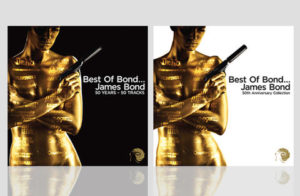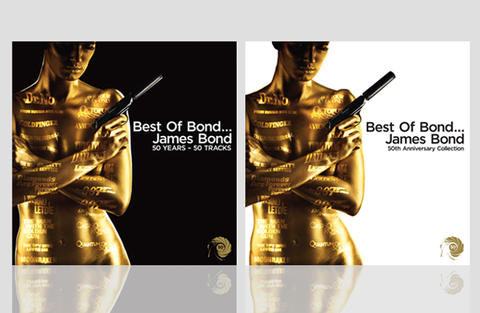This post is the first in a five part series.
 Snertman: Ok, so they all start this way. He walks onto the screen through this circle and somebody is going to try to shoot at him but he shoots first and blood runs down the screen.
Snertman: Ok, so they all start this way. He walks onto the screen through this circle and somebody is going to try to shoot at him but he shoots first and blood runs down the screen.
6-year-old me: Ick.
Snertman: OK, so they’re going to have this big fight on the plane now. The guy with the metal teeth is called “Jaws.”
6-year-old me: Eeek!
Snertman: OK, now some woman is going to start singing and a bunch of naked women are going to start dancing around.
6-year-old me: Coooooool.
That’s how I was introduced to James Bond. My next-door-neighbor and best friend Scott, who was more like a big brother to me growing up, took me to see Moonraker when it was out in theatres. Thus began my education on spies, booze, & womanizing. I would soon learn there was some other guy who played James Bond too. There were even some books about him. As the years passed I grew to understand that I’d been introduced to the franchise by arguably the worst entry in the series, but it was still a fun ride.
With 007’s 50th anniversary and the release of the stellar Skyfall both being celebrated this fall, James Bond is cool all over again. A thrilling mix of nostalgia and new-hotness are being discussed everywhere. Bloggers delight in discussing the cars, the women, the gadgets, the villains, the locales and the actors who have played “Bond, James Bond.” This imperfect, uneven franchise has yielded numerous “best to worst” lists for entries in the franchise.
Having watched all the films numerous times and even read all of Ian Fleming’s books at least one, here are the takeaways I can share:
- The “Event Film” phenomenon did not begin with Jaws or Star Wars, it began with Dr. No.
- The 60s were as close to perfect for the franchise as it gets. Every film from that decade is golden.
- Skip the 70s. The campiness is atrocioius and it’ll even make for better continuity if you go from On Her Majesty’s Secret Service straight to For Your Eyes Only.
- Lazenby and Dalton were not bad at all. They were early prototypes of Daniel Craig’s Bond — darker, more complex, and closer to the Bond of Fleming’s novels. The average moviegoer just hadn’t gotten there yet and the actors were simply in the unfortunate position of being the audience’s second choice to play Bond at the time.
- The music has become just as uneven as the series, but in different ways.
- When it comes to picking an artist for the theme song, the producers need to trust the composer.
And those last couple of points are where I want to take this article: the Music of 007.
I have been compiling my ultimate Bond Playlist for years. This year for the 50th anniversary, 50 Years of Bond Themes was released and is frighteningly similar to my own selections. I have a few extra gems that I’ll discuss over the course of this series, but if you start with the playlist in the above collection you’ll be able to follow along well enough.
We all know Monty Norman’s theme by heart. It’s as much a part of the character as the tuxedos and martinis. It is only 1 minute 48 seconds long, yet it’s immediately identifiable in just a few notes from any of 5 different parts in the song. It set the musical tone for the franchise and has been the undercurrent of many a score and a theme song.
John Barry, the four-time Oscar-winning composer, reportedly was brought in to help Monty Norman with the orchestrations on Dr. No and thus began his long-running tenure with the Bond Franchise. Infusing pop jazz into his more classical motifs, he created a distinct sound starting with From Russia With Love that has been ripped-off in every decent cold-war thriller since. His scores have largely been lush, beautiful epics that give depth and class to his films. Goldfinger and Thunderball remain his high water mark, just like the films themselves, but his scores on weaker films like Moonraker somehow transcend and elevate them to be worthy of the franchise despite ham-fisted plots or bad dialog.
In more recent years the baton was passed to David Arnold. Starting with Tomorrow Never Dies and continuing through Quantum of Solace, Arnold’s scores capture everything that was good about the classic Barry scores, but also infused Techno and Industrial elements to give them a fresher, hipper, more modern sound. The technique was a risky one but it unquestionably works. It was first attempted by Marvin Hamlish in his score for The Spy Who Loved Me to disastrous effects. The lone film from the 70s that actually tries to be a serious entry is marred by a score that sounds like a reject from Saturday Night Fever and would even have Christopher Walken plugging his ears shouting “No more cowbell! No more cowbell!!!”
In and around the great scores of Barry and Arnold exist other one-offs with mixed results. George Martin, the producer of the Beatles, scored Live and Let Die. Go figure that Paul McCartney would contribute the theme song as the most notable musical contribution to an otherwise forgettable soundtrack. Bill Conti, responsible for another theme song that became completely ingrained in pop culture (Rocky), would fare much better filling in for John Barry in For Your Eyes Only. The legendary Michael Kamen would give Licence to Kill a powerful brassy sound, but one that sounded like his other action films of the day, Die Hard and Lethal Weapon. Luc Besson’s go-to guy Eric Serra would score Bond’s comeback in Goldeneye, a weird mix of techno and euro-funk that sits somewhere between the successes of Arnold’s scores and the abyssmal failure of Hamlich’s.
Expecting to see David Arnold’s name once again in the credits of Skyfall, I gasped to see the film was scored by the inimitable Thomas Newman. A composer I highly respect, mostly for his contributions to The Shawshank Redemption and Finding Nemo, this was my first indication that Skyfall was going to be more than a brainless actioner. In retrospect this shouldn’t have surprised me. He is tied to Sam Mendes films the way John Williams is tied to Spielberg or Danny Elfman is to Tim Burton. Still, knowing Thomas Newman’s ability to heighten drama through subtlety and nuance, this was unquestionably going to be a different Bond experience. And as anybody who has seen Skyfall, it certainly didn’t disappoint.
There are the scores, and then there are the theme songs, other pop contributions, and the occasional cue from the score that stands out so much it deserves to be highlighted as a song in its own right. For this, we’re going to do more of a film-by-film breakdown.
Next Article: The 60s

